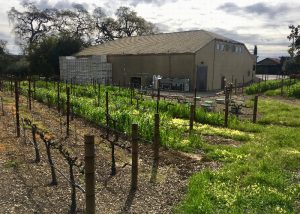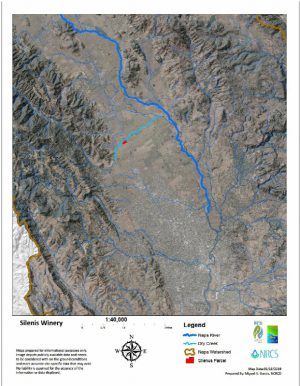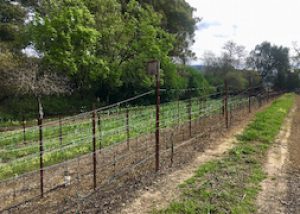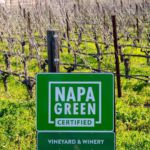
Vineyard area at Silenus Winery to benefit from riparian buffer.

Silenus Winery watershed area map.

Riparian replanting area at Silenus.
Silenus Winery Takes Farming to the Next Level
About 20 years ago the creek got plugged and the whole vineyard and winery flooded - barrels floating. We built a berm and planted Cabernet Franc but the area has been highly susceptible to Pierce’s Disease, with weak vines requiring continual replanting. The idea is to save the strong vines on the south side by giving up the weaker, exposed vines, and we think on balance we’ll get more fruit.”
- Brad Smith, Winemaker, Silenus Winery
Carbon provides the energy needed to drive on-farm processes, including the essential soil ecological processes that determine water and nutrient availability for the vines. Consequently, the CFP process views carbon as the single most important element, upon which all other on-farm processes depend.
- Miguel Garcia, Sustainable Agriculture Program Manager, Napa County Resource Conservation District
Silenus Carbon Farm Plan - Top Five Practices for Carbon Sequestration and GHG reductions over 20 years:
- Application of compost over 6.3 acres (10 tons/acre by end of year 5 and second application of 10 tons/acre beginning year 10) has the estimated potential to sequester 580 tons of CO2e
Hedgerow planting in 1.52 acres has the potential to sequester 240 tons of CO2e - Increasing cover crop from 60% to 75% cover area has the potential to sequester 40 tons of CO2e
- Planned riparian restoration practices on a 0.5 acre parcel have the estimated potential to sequester 10 tons of CO2e
- Implementation of alternate row tillage on 5.8 acres has the estimated potential to sequester 10 tons of CO2e
- Mulch application under the vines has the estimated potential to sequester 6 tons of CO2e
We’re always learning. The RCD had funding for Carbon Farm Planning and we decided why not take advantage of it? The process has been valuable and streamlined. Learning about complex concepts like carbon sequestration can be overwhelming - need folks like the RCD and NRCS to help you. The whole team is excited to be able to tell this restoration story.
- Brad Smith, Winemaker, Silenus Winery
Napa Green is about producing wine responsibly and being proud of our respect for the environment and for future generations.
- Elizabeth Vianna, Chimney Rock Winery


